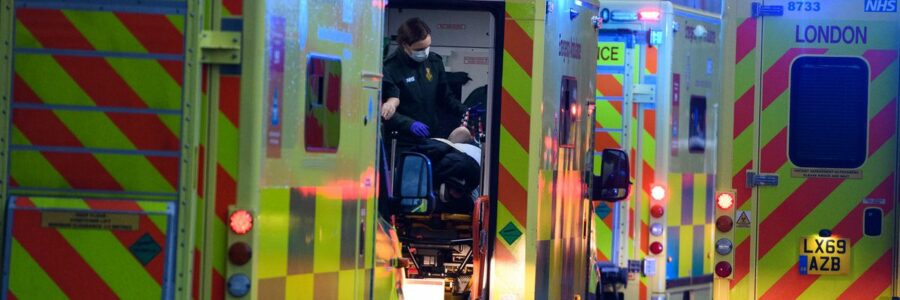
Swamped Hospitals Expose Depth of Britain’s Unfolding Crisis
If the British government’s goal throughout the coronavirus pandemic has been to protect the health service, the next few weeks will be the biggest challenge yet.
After overtaking Italy again as the country with Europe’s highest death toll, the U.K. is at the epicenter of the continent’sstruggle to contain Covid-19. Daily infections are at a record—one in 50 people in England now have the disease—while Prime Minister Boris Johnson this week shut schools and ordered the population to stay at home.
Medical staff say they may be forced to turn people away from hospitals if the latest lockdown fails to curb quickly enough a new strain of the virus that emerged in southeast England last month.
Winter already stretches health care and the virus means more patients are spilling into corridors and others are having to be treated in parked ambulances. The British Medical Association, which represents doctors, said the National Health Service is facing a crisis as rampant infections combine with staff illness and burnout.
“There are so many thousands of patients coming in,” said Tom Dolphin, 42, a consultant anesthetist at a London hospital. “The worrying thing is we probably haven’t seen the peak yet from the patients coming who got infectedover Christmas and the New Year period.”
During 10 months of turmoil over itshandling of the pandemic, the U.K. government managed to keep the country’s treasured NHS afloat and then became the first Western country to start immunizing its citizens. That now risks becoming a hollow victory as an accelerated vaccine program races against an out-of-control virus.
Medics had been pressuring Johnson to take nationwide action amid the surge in cases in recent weeks. But even at the weekend, the government wassuggesting that schools would remain open.
QuicktakeWhy the U.K.’s Mutated Coronavirus Is Fanning Worries
New treatments mean a greater proportion of Covid-19 patients are being kept alive, but many still need to remain in the hospital due to breathing difficulties. That’s also putting pressure on capacity. The health system had already entered the pandemic short of about 40,000 nurses.
For nurse Stuart Tuckwood, the tougher lockdown brings at least some relief as the country desperately waits for the vaccination drive to pay off.
“People know how bad things are and how much worse they’re going to get if cases continue to rise the way they are,” said Tuckwood, who works in a hospital in the south of England and is also national officer for nursing at union Unison. “We can’t rely on the vaccine being the magic solution. There can be no complacency about the ability of the health service and staff to cope.”
Britain’s death toll stood at 76,423, according to Bloomberg’sCoronavirus Tracker, after fatalities outpaced Italy’s in recent days. The number of daily cases on Tuesday rose to almost 61,000—the most since the coronavirus swept into Europe, though also after the U.K. ramped up testing.
Johnson said in a televised address on Monday that the number of Covid patients in hospitals in England was 40% higher than the first peak in April. The dramatic escalation has prompted him togamble on multiple fronts.
As well as locking down the nation again, the government is trying torapidly increase the number of people who get their first dose of vaccine by pushing back their second shots.
That’s aimed at stretching supplies of the two vaccines being rolled out: one from Pfizer Inc. and partner BioNTech SE and the other from AstraZeneca Plc and the University of Oxford. The move gained support from some health experts but sparked concerns from others,including Pfizer.
The aim is to maximize the number of vulnerable people who will get at least some protection in the shortest possible time. Johnson said on Tuesday that 1.3 million people had been immunized. The government has set a target of vaccinating almost 14 million people by mid-February.
The reality, though, is that Britain has little choice. There are almost 9,000 more coronavirus patients in hospital beds than there were on Christmas Day—the equivalent of nearly 18 hospitals, according to the group NHS Providers.
The stress on doctors and nurses is increasing, and “that really does trigger a need for a new way of thinking,” said Doug Brown, chief executive of the British Society for Immunology. “The risk of not doing this is much greater.” In a normal world, the country would stick to the original dosing schedules tested in the clinical trials, he said. “We’re not in a normal world at the moment.”
Protecting the NHSresonates in Britain. During the first lockdown in spring, people stood on their doorsteps and applauded healthcare workers every Thursday evening and children painted rainbows to stick on the front windows. The government is relying on a fatigued nation to step up again, with the NHS now key to rolling out the vaccines.
Read More: U.K. Hospitals Face Breaking Point as Johnson Prepares Lockdown
Finding and deploying enough staff to carry out around 2 million vaccinations a week is no easy task and will have a big impact on the health service, saidRichard Sloggett, a former special adviser to Health Secretary Matt Hancock.
“It certainly feels like we are moving to a point where we are betting the house on a vaccine program,” said Sloggett, a senior fellow at the Policy Exchange think tank.
The hope is that the lockdown will work before hospitals are unable to cope, said Dolphin, the anesthetist, who is also a member of the BMA’s council. The restrictions are due to run in England until at least mid-February, though Johnson signaled in a press conference Tuesday there could be many more months of restrictions ahead.
“It’s getting to the point where the service isn’t what we would normally recognize as fit for the U.K.,” Dolphin said. “Or fit for any country, really.”
— With assistance by Suzy Waite, and Neil Callanan
Source: Read Full Article